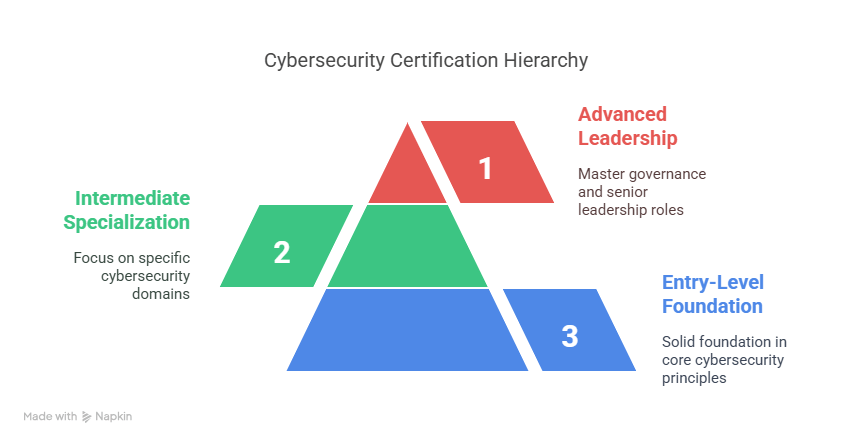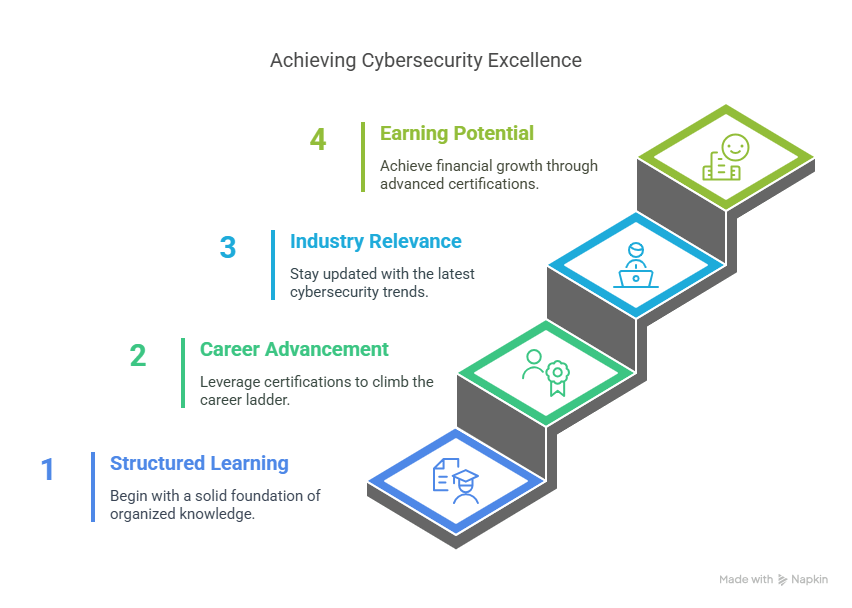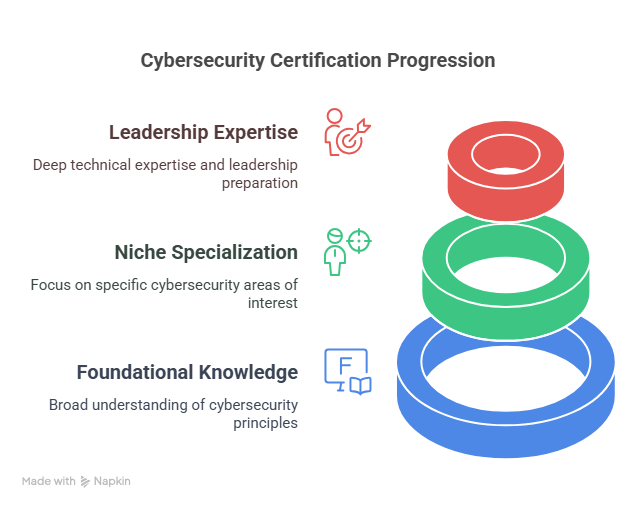Table of Contents
Cybersecurity is a rapidly growing field with increasing demand for professionals who can secure sensitive data, systems, and networks. With cyber threats becoming more complex and sophisticated, there has never been a better time to enter the industry. However, with so many Cybersecurity Certification Test options available, it’s important to follow a structured certification pathway that helps you progressively build your knowledge and expertise.
This Cybersecurity Certification Test Pathway provides a clear roadmap for advancing in your cybersecurity career, from foundational knowledge to leadership roles. Whether you're just starting out or looking to specialize, this guide will help you navigate the pathway effectively and efficiently.
What is a Cybersecurity Certification Pathway?
The Cybersecurity Certification Pathway is a structured approach to earning industry-recognized certifications at different career levels. This pathway ensures that professionals progressively build their knowledge and skills, starting from foundational certifications to advanced programs that focus on leadership and specialized roles in cybersecurity.

The pathway is typically divided into three stages:
-
Entry-Level Certifications: These certifications provide a solid foundation in core cybersecurity principles.
-
Intermediate Certifications: These certifications focus on more specific cybersecurity domains such as ethical hacking, cloud security, and auditing.
-
Advanced Certifications: These certifications are for individuals looking to master governance, risk management, and senior leadership roles like CISO or security architect.
By following this structured pathway, you can align your learning with your career goals, ensuring you acquire the knowledge and skills that will make you a competitive candidate in the cybersecurity job market.
Why Follow a Cybersecurity Certification Pathway?
Following a Cybersecurity Certification Pathway provides several benefits that enhance your career prospects and ensure you are well-prepared for the evolving cybersecurity landscape:

1. Structured Learning Journey
A structured certification pathway ensures that each certification builds on the previous one, allowing you to gradually advance your knowledge and skills. This helps you avoid confusion and ensures that you acquire new concepts in an organized and practical manner.
2. Career Advancement Opportunities
Certifications are highly valued by employers, and following the right certification path can help you stand out when applying for roles. Entry-level certifications like CompTIA Security+ open doors to your first job, while advanced certifications like CISSP and ACSMI prepare you for senior leadership positions.
3. Staying Industry-Current
The cybersecurity field is constantly evolving, and certifications ensure that your skills stay up-to-date with the latest trends and best practices. Certifications such as ACSMI Certification include regular updates to reflect changes in the cybersecurity landscape.
4. Increased Earning Potential
Professionals with verified certifications tend to earn higher salaries. For example, those with CISSP can command an average salary increase of 20-30%. By pursuing certifications aligned with your career goals, you can increase your earning potential and achieve long-term financial growth.
Cybersecurity Certification Pathway Breakdown
The Cybersecurity Certification Pathway can be broken down into three key stages based on experience levels. Each stage is designed to provide the knowledge and skills needed to progress in the field of cybersecurity.
1. Entry-Level Certifications
Entry-level certifications are ideal for beginners with little or no prior IT experience. These certifications introduce fundamental cybersecurity concepts such as network protection, system vulnerabilities, and incident response.
-
Google IT Cybersecurity Professional Certificate
-
Duration: 4 to 6 months
-
Key Features: Beginner-focused, hands-on labs, flexible schedule.
-
Career Roles: SOC Analyst, Cybersecurity Researcher.
-
-
CompTIA Security+
-
Duration: 4 to 12 weeks
-
Key Features: Vendor-neutral, focuses on network security, cryptography, and compliance.
-
Career Roles: Security Specialist, Systems Administrator.
-
-
Microsoft Security Compliance Certificate
-
Duration: 6 to 8 weeks
-
Key Features: Simplified content, targeting key Microsoft platform threats and compliance goals.
-
These certifications provide a solid foundation for those new to cybersecurity, giving them the skills necessary to handle the most common cybersecurity tasks.
2. Intermediate Certifications
After completing entry-level certifications, professionals should specialize in specific areas of cybersecurity. Intermediate certifications provide hands-on skills and more detailed knowledge in targeted areas.
-
Certified Ethical Hacker (CEH)
-
Focus Area: Offensive cybersecurity techniques and penetration testing.
-
Ideal For: Aspiring Penetration Testers, Red Team Analysts.
-
-
Certified Information Systems Auditor (CISA)
-
Focus Area: IT systems auditing and regulatory compliance knowledge.
-
Ideal For: IT Auditors, Compliance Officers.
-
Intermediate certifications deepen your expertise in areas like penetration testing, risk management, and cloud security, making you more valuable to employers looking for specialized skills.
3. Advanced Certifications
Advanced certifications are designed for professionals aiming to lead or specialize in complex cybersecurity areas. These certifications are essential for individuals seeking senior roles like CISO, Security Architect, or Cybersecurity Manager.
-
Certified Information Systems Security Professional (CISSP)
-
Focus Area: Governance, risk management, system controls, and compliance.
-
Ideal For: Security Architects, CISOs.
-
-
ACSMI Certification
-
Focus Area: Combines advanced technical training with leadership skills in areas like cloud security, incident management, and cryptography.
-
Unique Factor: Offers 400+ modular topics for continuous learning.
-
Ideal For: Cybersecurity Managers, CISOs.
-
Advanced certifications prepare professionals to lead large-scale cybersecurity operations, manage enterprise security strategies, and guide teams in implementing security protocols at an organizational level.
How to Progress Through the Cybersecurity Certification Pathway
The It Specialist Cybersecurity Certification Pathway helps you systematically progress from foundational knowledge to specialized expertise and leadership. Here's how to effectively move through each stage:

1. Start Small With Foundational Certifications
Building a strong foundation is essential for a successful cybersecurity career. Start with certifications like CompTIA Security+, Google IT Cybersecurity, and Microsoft Security Compliance Certificate to understand the fundamentals. These certifications provide you with a broad understanding of cybersecurity principles, preparing you for more advanced topics later.
2. Define Your Niche With Intermediate Certifications
Once you’ve gained foundational knowledge, focus on specific areas of interest such as ethical hacking, cloud security, or compliance. Intermediate certifications like CEH or CISA allow you to specialize in these fields, making you more marketable and prepared for job roles in your chosen niche.
3. Aim for Leadership With Advanced Programs
After gaining expertise in your chosen area, aim for advanced certifications like CISSP, CISM, or ACSMI Certification. These certifications will not only deepen your technical expertise but also prepare you for leadership positions where you can guide cybersecurity strategies, manage teams, and oversee organizational security initiatives.
Why the Cybersecurity Certification Pathway Matters
The Cybersecurity Certification Pathway is essential for anyone looking to succeed in the fast-growing and dynamic cybersecurity field. Each stage builds on the previous one, helping you advance from a beginner to a leader in the industry. Whether you're changing careers or advancing in your current role, following the pathway ensures you gain the knowledge and skills needed to thrive.
Final Thoughts
Building a successful cybersecurity career requires a structured approach. Whether you're just starting or looking to advance, the Cybersecurity Certification Pathway helps you map out your journey. From foundational certifications like CompTIA Security+ to leadership certifications like CISSP or ACSMI, this pathway will provide you with the skills and confidence to succeed.
FAQs
1. What is the best certification to start my cybersecurity pathway?
CompTIA Security+ and Google’s Cybersecurity Certificate are ideal for beginners, offering a comprehensive introduction to cybersecurity.
2. How many certifications should I pursue in a cybersecurity career?
This depends on your goals. One certification per career stage—beginner, intermediate, and advanced—will help you progress efficiently.
3. Can I pursue the ACSMI Certification as part of this pathway?
Yes, the ACSMI Certification can be integrated into your pathway. Its modular system offers flexibility, catering to all career stages.
4. How long does the cybersecurity certification pathway take?
The timeline depends on the certification level and personal pace, but progressing from beginner to advanced certifications can take 3-5 years.
5. Are certifications better than degrees for cybersecurity jobs?
Certifications validate role-specific skills faster than degrees, but both have their place. Degrees provide broader education, while certifications demonstrate specialized expertise.

Leave a Reply